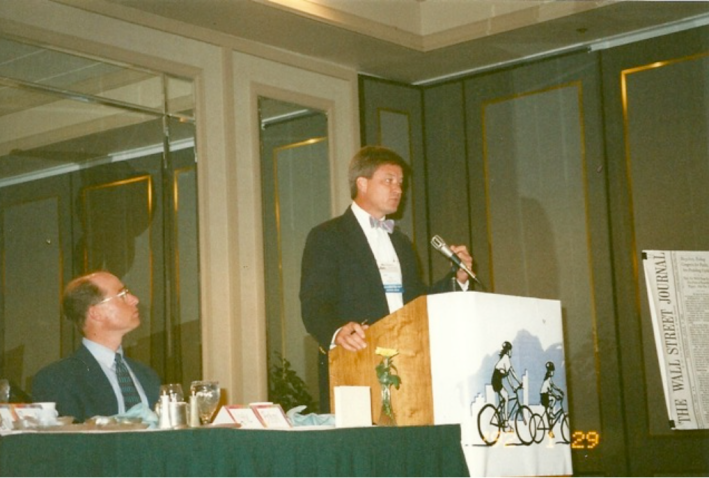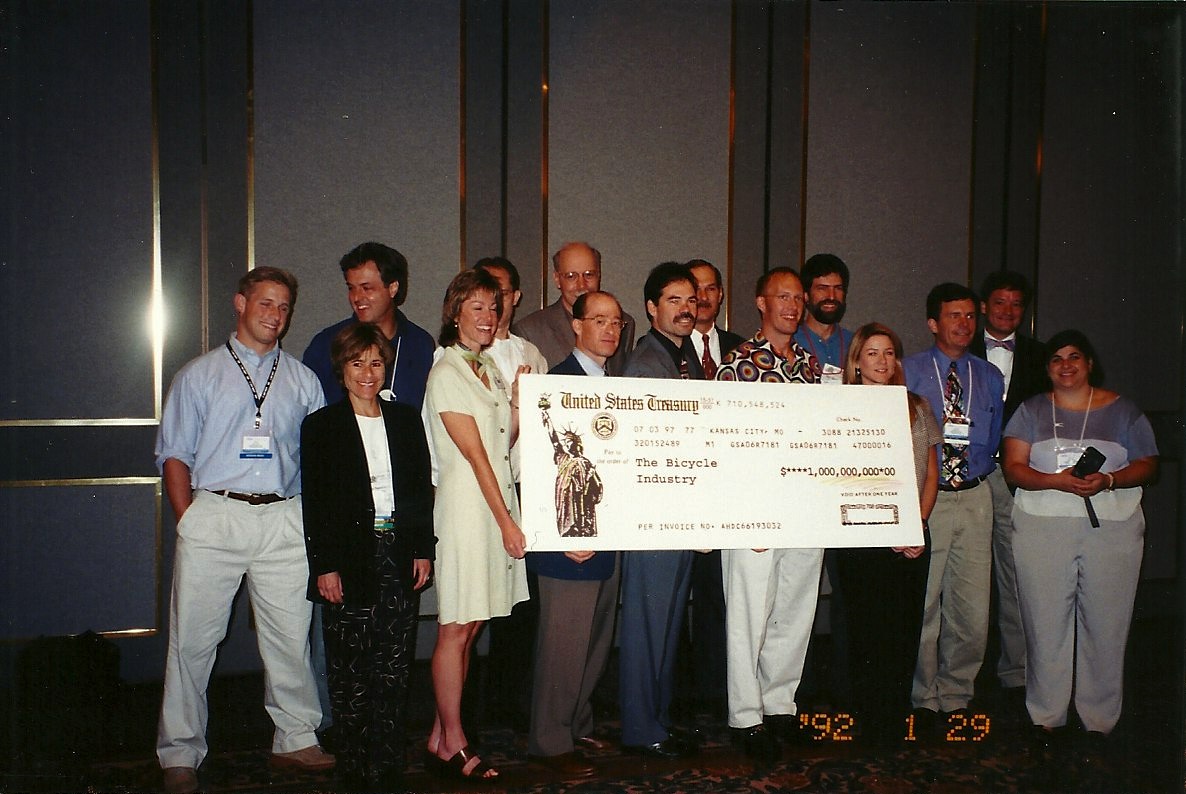It didn’t surprise safe and sustainable transportation advocates when Hoboken, N.J. won national praise for eliminating traffic deaths and serious injuries seven years in a row, thanks in part to its ambitious effort to eliminate blind spots at intersections by preventing drivers from parking near corners. But apparently, it was a shock to many others — including right-wing political pundit Jordan Peterson.
In March, Peterson took to X to share his outrage at the Associated Press for sharing the good news, stating, “You have become pathetic beyond comprehension @AP and the woke death will soon visit you.”
Being triggered by safe streets and Hoboken’s zero traffic deaths in 7 years is certainly a mood 🤷🏽♂️ https://t.co/aE87yi2aFj pic.twitter.com/e8utAgNvz8
— Ravinder S. Bhalla (@RaviBhalla) March 2, 2024
As someone who embraced the woke death years ago, I’m delighted Hoboken’s Mayor, Ravinder S. Bhalla clapped back, noting that “Being triggered by safe streets and Hoboken’s zero traffic deaths in 7 years is certainly a mood.” But while much of America grapples with moving beyond proclamations to the real changes that will allow us to achieve Vision Zero at the national scale — and as the federal transportation package is set to expire in 2026 — it’s clearer than ever that we need even more strategies to push back against the toxic car-first culture times we live in.
I think it’s time to reframe the transportation conversation as a united, focused, collaborative messaging campaign. And we can find a great example in recent history: the 1996/1997 “Bikes Belong” political reauthorization campaign.
Before 'Bikes Belong'
Years before the Bikes Belong campaign was launched, the first significant federal funding for active and shared mobility was made available as part of the 1991 Intermodal Surface Transportation Efficiency Act (ISTEA). And compared to recent history, that was a huge win: in the 18 years before ISTEA was enacted, the federal government had only devoted $40.7 million towards bicycle and pedestrian-focused projects across all transportation funding categories. ISTEA, by contrast, poured more than a billion into biking and put bicycle and pedestrian coordinators in every state, among other changes.
Still, the amount ISTEA granted to active transportation was decimal dust compared to what highways received — and nevertheless, when it came time to reauthorize our national transportation programs, the national highway lobby wanted to slash even that paltry funding for biking, walking, and transit.
The Rails to Trails Conservancy was integral to getting ISTEA originally passed, and wanted to see funding for sustainable modes preserved or expanded in the next transportation package. As soon as they realized the highway lobby threat, they mobilized with an innovative idea; get the bike industry to fund a collaborative, multi-organization, inside-outside reauthorization campaign to make sure active transportation stayed funded. They called the campaign “Bikes Belong.”
Fortunately for active transportation, the bike industry said yes, and their efforts paid off.
ISTEA eventually became TEA21, the most expensive public works legislation ever passed by Congress at that time. It built on its predecessor to move beyond car-only transportation with components such as Transportation Enhancements that invested in facilities for walking, bicycling, historic preservation, scenic beautification, land acquisition, and environmental mitigation.
Here are two key strategies the campaign used to win that today’s advocates and allies could draw on for a Bikes Belong campaign 2.0 — and, if you read to the end, an opportunity to be part of a deeper conversation on the opportunities of inspiring a future campaign.
Bikes Belong was a National Team Effort
Bikes Belong was a collaboration of Rails to Trails, the Bicycle Federation of America, and the League of American Bicyclists, as well as biking/walking advocates and bike industry professionals from across America.
Launched during the 1996 election year as Congress began a two-year negotiation over a bill to fund our core federal transportation programs, the initial goal of Bikes Belong was to help elect or re-elect leaders to the House and Senate who would fight to save and add more money for bicycle and pedestrian infrastructure in that bill. After the election, the campaign focused on shoring up support and persuading more elected officials to say yes to active transportation funding.
With a budget of $300,000, Bikes Belong worked both the halls of Congress and key congressional districts where they knew they’d have the most impact or felt they could sway a vote. While some very early internet was used, they relied mostly on working the mailing lists of their combined organizations with letters and newsletters to members, phone calls, and in-person meetings.
They also focused on strong messaging, hiring well-known Democratic political strategist and pollster Celinda Lake’s organization to host a series of polls to determine baseline attitudes towards bicycles and those who bike and help develop language to win more support for their cause.
The Campaign Hosted Proactive Media Outreach
As the Field Director of Bikes Belong, Charlie Gandy, the founder of BikeTexas and a recovering politician (full disclosure: he’s my husband) met with the editorial boards of the nation’s top newspapers to pitch the campaign and garner support. The campaign received favorable coverage in The Wall Street Journal, Los Angeles Times, The Denver Post, Austin American Statesman, and more.

Further, the campaign reached out to the local and regional media in any of the key districts, making sure to feature the local active transportation advocates and/or bike dealers whenever possible.
The goal of the media outreach was to demonstrate to congresspeople and their constituents the value of a broad-based and evolved federal transportation bill that continued to move beyond a “car only” mindset, and that would be more effective for state and local organizations to create progressive policies, programs and infrastructure.
We Don’t Need Proof, We Need to Sell the Solution Better
The cost of our current car culture is not only the staggering amount of mostly avoidable death and serious harm but tremendous damage to our physical and mental well-being too. Electric cars aren’t the end-all-be-all solution, but you wouldn’t know that by reading most news.
Imagine if TV stations, newspapers, radio stations, social media, and podcasts in every state carried compelling stories and a united message about why — and how — to move beyond dangerous car-centered transit and support funding to expand safe, active, shared, and sustainable transit for the well-being of people, communities, and the planet at large? Not since the original Bikes Belong campaign has there been a collaborative, nationally focused effort to shift the narrative about transportation.
As we wade deeper into this election year and Congress gears up to pass yet another federal transportation bill in 2026, it’s time for us to move the conversation forward. It’s time to ideate a Bikes Belong campaign 2.0, perhaps with a more all-encompassing name like People Belong. After all, at its heart, transportation is about moving people.
If you’re a professional organization or advocate who’d like to be a part of a conversation on inspiring more active transportation funding in the next federal transportation bill via a collaborative national campaign, please register for a Zoom Meeting with Melissa Balmer & Charlie Gandy on Wed, Aug 28th at 11 am PT/12 pm MT/1 pm CT/2 pm ET. Register here.






